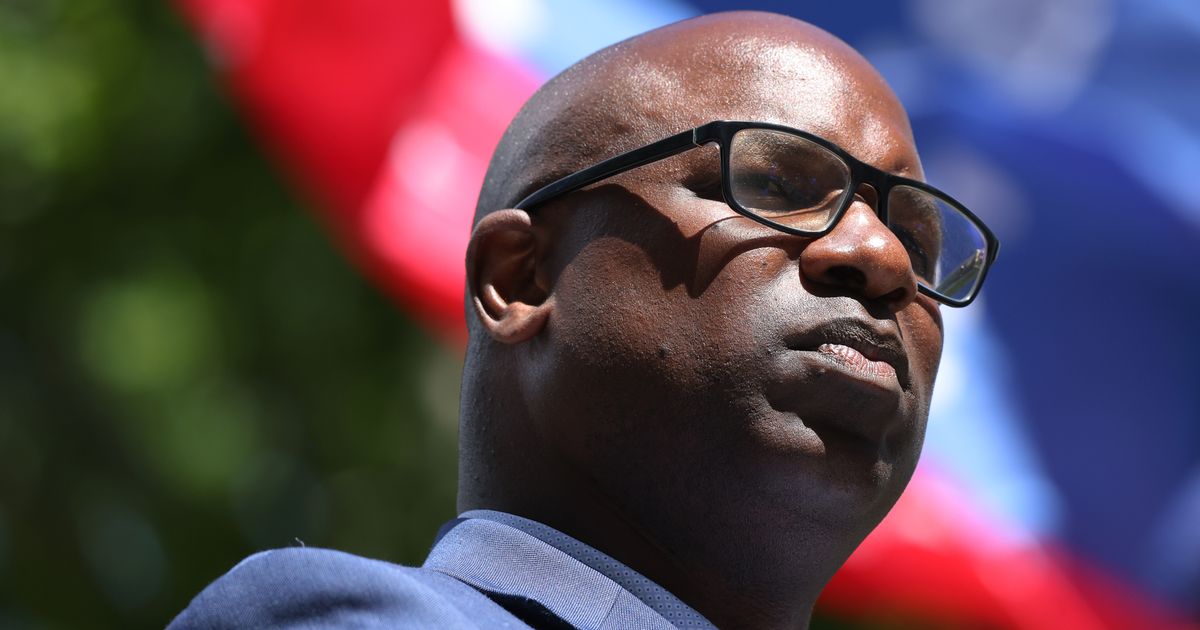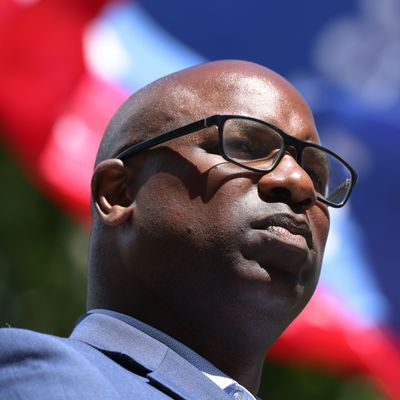
How Gaza Has Shaken Black Politics
Leaders associated with civil rights are caught in a trap of Israel’s making.
THE SYSTEM JUNE 26, 2024
How Gaza Has Shaken Black Politics
By Zak Cheney-Rice, a features writer for New York
Jamaal Bowman, who lost his primary on Tuesday night. Photo: Getty Images
Representative Jamaal Bowman started his political career as a progressive supporter of Israel. He was one of several Black candidates who rode the protest-friendly fervor of the George Floyd summer to political triumph in 2020, defeating three-decade incumbent Eliot Engel, one of the staunchest Israel supporters in the House, in New York’s 16th Congressional District by drawing voters from whiter and more affluent parts of Westchester County and Blacker, more Latino and working-class sections of Yonkers and the Bronx.
His position on Israel began to change in 2021, when as a freshman congressman he visited Israel and returned with a dim view of the government’s willingness to pursue a two-state solution, according to HuffPost. His winning coalition began to splinter as his denunciations of Israel became more acute and fell apart in the aftermath of October 7, when he characterized the Israeli assault on Gaza as a genocide. The American Israel Public Affairs Committee recruited George Latimer, an Israel hawk, to primary Bowman with a campaign that painted him as out of touch with his constituents. On Tuesday, Bowman was easily defeated.
Bowman’s reelection campaign revealed a deep degree of naïveté about how to win elections; there was no way he could galvanize enough antiwar votes to overcome Latimer’s appeal to Israel’s supporters. But Bowman’s brief tenure in Congress also revealed the predicament that Black Democrats find themselves in because of the war in Gaza, which has forced them to compromise the very moral bona fides that gave them political clout to begin with.
When considering Bowman’s downfall, it is worth comparing his trajectory to that of Senator Raphael Warnock of Georgia, a former pastor for Martin Luther King Jr.’s parish in Georgia who won his 2020 race in part because of the groundswell of support for civil-rights leaders in the wake of the Floyd killing. He is now considered a moral beacon for his colleagues in Congress. “ Special and important and extraordinary” is how his fellow Georgia senator Jon Ossoff has described Warnock’s blend of governance and godliness.
On Israel, though, Warnock started his political career on the other side of Bowman — as an Israel critic. When he was preparing for his 2021 runoff election that would determine the partisan balance of the Senate, he was confronted with a letter he had signed in 2019 with other clergy likening Israel to apartheid South Africa. The position he endorsed at the time was in line with a growing identification among Black activists with the Palestinian cause, which many saw as a continuation of the anti-colonial struggles of the mid-20th century.
The letter became a minor scandal, and Warnock was compelled to pen a correction proclaiming it a “mistake” to condition military aid earmarked for “the greatest proponent of democracy in the Middle East.” He characterized his affection for Israel as an extension of the solidarity once demonstrated by Jews in Georgia toward Black Christian civil-rights activists — a “tradition of interfaith understanding and respect.” He expressed concern about the expansion of settlements in Palestinian territory and advocated for a “two-state solution” but otherwise remained a strong supporter of the Israeli government as he made his way to Capitol Hill, where he is now a reliable pro-Israel vote.
The calculation might appear to be as simple as it is cynical: Support Israel or face the electoral consequences. It is a calculation that could apply to lawmakers of any race. Except the situation is different for Black lawmakers, who are valuable to the Democrats and others precisely because of their association with civil rights.
This was made clear in March, when the Israeli watchdog FakeReporter revealed that the government of Benjamin Netanyahu had launched a disinformation campaign against more than 100 American lawmakers with a special focus on influencing Black Democrats. A Tel Aviv–based political marketing firm called Stoic was paid $2 million last year by Israel’s Ministry of Diaspora Affairs to set up roughly 600 fake profiles on X, Facebook, and Instagram, along with three fake news websites. Stoic used these proxies to post more than 2,000 often AI-generated comments and fabricated articles per week expressing support for Israeli military action in Gaza and undermining pro-Palestine activists. The posts could be slapdash. More than one account featured a Black male avatar that self-identified as a middle-aged Jewish woman.
It is telling that the Ministry of Diaspora Affairs felt that Black lawmakers were either particularly susceptible to flip or particularly desirable to have on Israel’s side. Both the Palestinians and the Israelis seem eager to claim the moral authority that comes from having the support of the self-styled inheritors of America’s civil-rights legacy — high-minded Black officials of the kind that mid-century activists once dreamed of electing. The campaign’s targets included Brooklyn’s Hakeem Jeffries, who could become the first-ever Black Speaker of the House; Representative Ritchie Torres from the Bronx, one of the House’s most vocal Zionists; and Warnock.
The campaign has been covered by the New York Times, Politico, and others, yet no sense of outrage can be detected emanating from Washington. If you consider what the response would have been if Russia or China had been behind such aggression against American officials, it becomes even more apparent that Netanyahu, a nominal ally of the U.S., finds laughable the notion that he might be obligated to act like one. No matter how many times the prime minister snubs his nose at Joe Biden’s entreaties or how deep the public revulsion grows over Israel’s destruction in Gaza, the loyalty of the U.S. political class toward the Israeli government remains ironclad.
Warnock recently led calls for President Biden to negotiate more aid for beleaguered Gazans and to recognize a “non-militarized” Palestinian state, even if it remains to be seen whether there will even be a state to recognize once Israel is through. By and large, though, he has been a loyal ally, and that was not enough to stop Netanyahu’s government from treating him like a foreign asset — to say, essentially, that it was going to openly leverage the civil-rights legacy that he and his Black colleagues have inherited and expect him to say and do nothing about it.
One of the themes of America’s post-Floyd politics is that the shining promise of 2020 has dimmed as politicians of all stripes have turned against the movement and what it stood for. This has primarily manifested as retreating from law enforcement reform and doubling down on cops and criminalization. Yet the movement’s greater promise lay in how broadly its ethos could be applied. If Black humanity was no longer negotiable in the U.S., the same must be said for Palestinians living under Israeli occupation. Instead of delivering a mandate to pro-justice candidates, the movement’s aftermath has seen their influence harnessed to replenish Israel’s arsenal.




